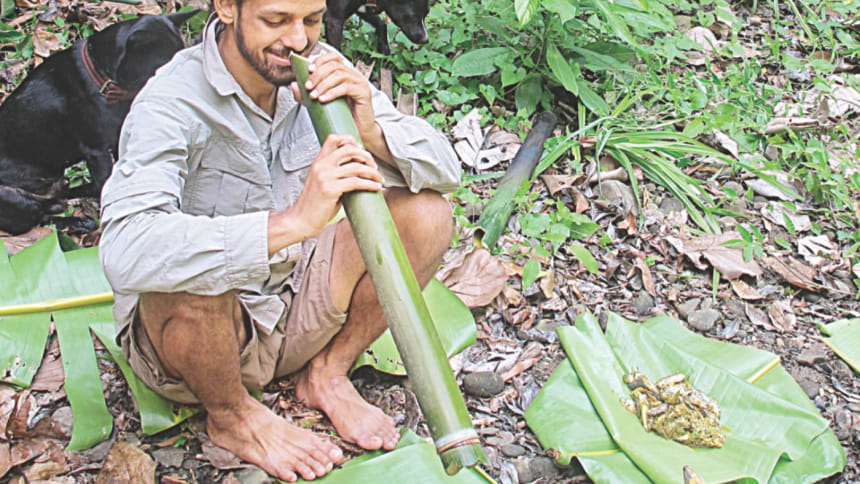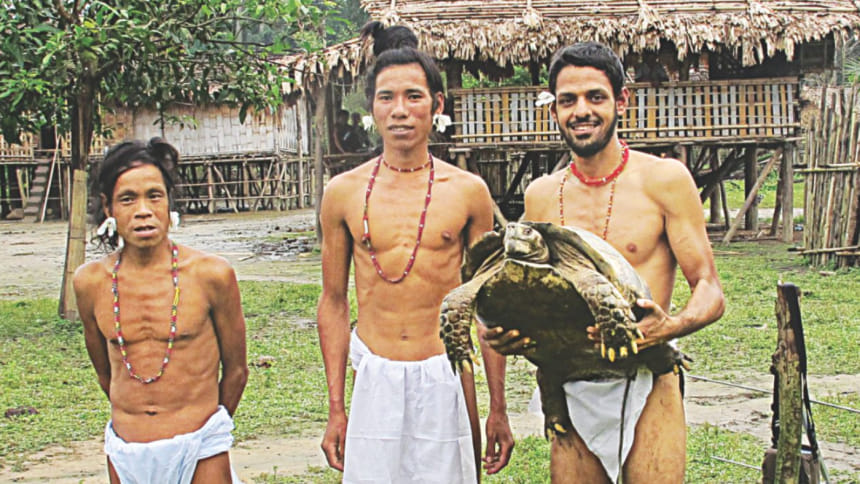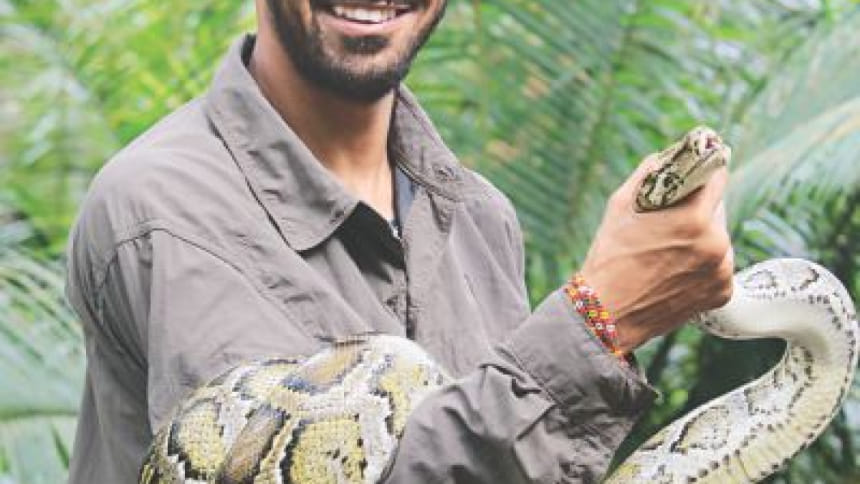One tree at a time: Conversation with Caesar

The 22nd of April marks Earth Day when the world collectively demonstrates support for environment protection. To celebrate this very important discussion in times when our country grapples with the challenges of development, we sit down with one of the pioneers of conservation in Bangladesh, Shahriar Caesar Rahman, the 2017 Future for Nature award winner, and the first person to conduct the most comprehensive wildlife survey in Chittagong Hill Tracts, yielding discoveries that delightfully surprised the entire world. A conservationist and a nature lover, we sat down to learn what makes Shahriar Caesar Rahman a friend of nature, his motivations and words of wisdom that he has for the next generation of conservationists.
Shahriar Caesar Rahman sat before me, sipping a glass of juice. Another glass and he would declare that to be his lunch for the day. He was dressed in a simple red plaid shirt and a black pant, a singular bracelet adorning his wrist, all combining to give the slightest hint of his burgeoning stature. Caesar is fast becoming the poster child of the conservation scene in Bangladesh. As far as changemakers go, Caesar fits the description to a T and then some. Unassuming and reserved, in the glitzy canteen of the Daily Star, Caesar seemed out of his comfort zone. “My father was in government service. Every few years we had to move to different areas. It was very difficult for me to fit in growing up,” he says, explaining that this itself became an inner struggle he repeatedly had to come to grips with. “I basically grew up with pet chickens, birds and goats,” he remembers with a smile. It was perhaps in these innocent friendships that Caesar discovered what he wanted to do with the rest of his life.

“As I grew up, I started volunteering for various organisations that dealt with animal rights or ran animal shelters,” he says, when asked what started his love affair with nature. Of course, he reiterated that the love was always there. In fact, those who know him often speak of days when he wanders into fields of gleaming grass, lying down nestled among them, in quiet reflection. “I have been volunteering since High School. When I went to New York, I'd carefully save my tiffin money to fund my trips to other similar organisations which were quite far from where I lived,” he says. Friends and well-wishers were shocked at this and often asked him why he would go through so much trouble. “I knew what I wanted to do,” he declares.

His soft-spoken and quiet demeanour masquerades the amount of dedication he has for his work. He is often found in remote corners of the Chittagong Hill Tracts, sitting and living with the residents of the communities. He has documented 26 globally-threatened species in the Sangu Reserve Forest. He also initiated the Python Project in Bangladesh in association with Centre for Advanced Research in Natural Resources & Management (CARINAM) -- a not-for-profit NGO dedicated for wildlife conservation. Caesar was also the first to discover the critically endangered Arakan Forest turtle and Keeled Box turtle, along with rediscovering populations of the Asian Giant tortoise, the largest tortoise in Asia. In fact, in Chittagong Hill Tracts, Caesar has made a reputation discovering magnificent creatures that would only exist in local fables and history books. His resume also shows that he is a co-founder and CEO of Creative Conservation Alliance (CCA), a group dedicated to ecological and cultural preservation within Bangladesh's last remaining swathes of wilderness. Last year the group made headlines when they discovered tiger pug marks in CHT, even though they were long thought to be have left the area. They also discovered the marbled cat, the sun bear and the Gaur.

Along with the discovery though, Caesar, and the group's, most notable achievement is how they have managed to involve entire communities in their work. In 2015, he initiated the Schools for Conservation programme, which began by setting up four primary schools in the remotest villages of the Sangu Reserve Forest. The schools were part of a deal where the villagers agreed to cease hunting the Asian giant tortoise and fourteen other highly threatened wildlife species. He is also actively involved in creating alternative methods of livelihood in the communities he works with setting up nurseries, provides avenues to sell their handicrafts and even going as far as reforming former hunters by turning them into para-biologists. “90% of all the problems stem from people but the people themselves are the solution to the problems. Every action is much more impactful when it comes from within the community,” he explains. In fact, his method of staying in communities, eating with them and staying around them is what earns him their trust and thus, makes his work more valued. “All stakeholders need to be involved for maximum efficiency. You cannot change people by force. It takes real commitment and understanding,” he concludes.
On Earth Day, we celebrate individuals like Caesar, who break away from the trend, blaze their own trail and make supreme sacrifices, only to see the world around them change for the better, one tree at a time. “The diversity of wildlife in Bangladesh is remarkable. Our diversity is a part of us; it's not a luxury we have,” he emphasises. “I am not going to be anyone's saviour. I am merely a facilitator. The people and the community are the real saviours,” he says. When asked what advice he had for others who want to do something positive, Caesar was to the point. “Follow your passion mercilessly. Turn your passion into your career. And be positive. Never lose hope.” With that Shahriar Caesar Rahman bid farewell. As he walked away, he cast a shadow the length of which perhaps even he couldn't understand. People like Caesar, real changemakers, humbly and quietly, preserve the beauties of the world. And they do it for the rest of us, asking for nothing else in return.

 For all latest news, follow The Daily Star's Google News channel.
For all latest news, follow The Daily Star's Google News channel. 



Comments